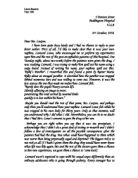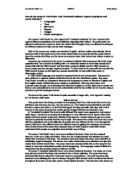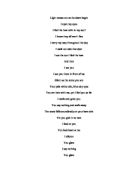The pedestrian.
The pedestrian is set in America in the year 2052. The plot of the story is about Leonard Mead out for a walk which would seem normal enough any other time but in this case it's set in the future where everyone is confined to there home and walking is illegal. The theme of the story is in my opinion about a person's right to freedom and rebellion against the system. Leonard does what he wants to do regardless of the fact that it's illegal or not. He enjoys walking and has been doing it for ages and would keep doing it if he had the chance but unfortunately he was caught and taken to be brainwashed to be like everyone else: content to sit and watch T.V. and never enjoy life. Mr Leonard Mead was as I said a free spirit and a rebel of sorts he didn't want to be programmed like everyone else into a specific routine and being kept off the streets. There are days where he would walk for hours "Sometimes he would walk for hours and return only at midnight", He also felt a distain for all the programmed people and looked down on them "Hello, in there he whispered to every house on every side as he moved 'What's up to-night on Channel 4, Channel 7, Channel 9? Where are the cowboys rushing, and do I see the United States Cavalry over the next hill to the rescue?" This quote shows that the idea of television was a joke to him and he seemed to enjoy making fun of the people
How do these different poets explore what their background and culture means to them?
How do these different poets explore what their background and culture means to them? I will be looking at what the subject of each poem is, the ideas, attitudes and values, the layout structure and form, language and any other techniques or points of interest that I may wish to comment upon. I will also help to establish what background and culture means to the poets. In the poem "Search for your tongue", the chiefly is about a teenage girl who is from a foreign country. The girl is finding it hard to live with two languages at once. In "unrelated incidences", the poem chiefly is about making fun of/making a joke of the way that the English language is spoken. I think that the poem is trying to show that if you speak in a common accent, it doesn't mean that you are lower class or any less intelligent. The poem "presents from my aunts in Pakistan" is about a girl brought up in America, but her family is from Pakistan, so she feels torn between the two cultures. She does not feel comfortable in either of the cultures. The tone at the beginning of "search for your tongue" is very aggressive. "You ask me what I mean." At the beginning of the poem, the poet's voice is very defensive. About half-way through the poem, the poet's voice starts speaking in Gujarati, this language is part of her life and she is confused by it. In the poem "unrelated incidents", the poet is
Half-Caste Unrelated Incident use of satire comparison
Both Half-Caste and Unrelated Incidents have differences and similarities in structure, language and ideas but they both send the same message of protest against the people who prejudice and have negative social attitudes towards their culture. The prejudice in Half-Caste is shown when Agard writes, "Excuse me standing on one leg I'm half-caste", this shows the portrayal of how people see someone half-caste as not a complete person but as someone with half the qualities. Agard also makes that into a sort of answer because the absence of punctuation in the first small paragraph leaves ambiguity so he could also be implying that if he was a one-legged person then he should be considered as half-caste. Whereas in Unrelated Incidents, Leonard shows the prejudice in a slightly different way when he writes from a news anchor's thoughts but using a Glaswegian accent "if a toktaboot thi trooth lik wanna yoo scruff yi widny thingk it wuz troo." The way the newsperson assumes that a Scots accent is less credible than an RP accent and that there is a 'right' way to talk could show what the BBC viewed as 'proper' English at the time and how they imposed this idea at the Scottish people by telling them to 'belt up'. Both poems are about language so they use similar language techniques to make important points. Unrelated Incidents is about how the newsperson thinks that the
Dear Ms. Loxton.
3 Denton Street Paddington Hospital U.S.A 2nd October, 1970. Dear Ms. Loxton, I have been quite busy lately and I had no chance to reply to your letter earlier. First of all, I'd like to make clear that it was your own nephew, Leonard Lowe, who encouraged me to perform my experiments upon him and the rest of the post-encephalitic patients of this hospital. One Tuesday night, about two weeks before the patients were given the drug, I was studying Leonard; I was trying to make him spell out his name using a ouija board. Instead of writing his name, your nephew spell out this: 'Rilke's Panther'. I researched this and found a poem by Rainer Maria Rilke about an encaged panther. It described how the panther was trapped behind numerous bars and was willing to come out. However, it was the last stanza the one that made me realise how Leonard felt: "Rarely does the pupils' heavy curtain lift. Silently allowing an image to enter, penetrating this void carried by wearied limbs quickly it is lost within his heart." Maybe you should read the rest of that poem, Ms. Loxton, and perhaps only then you'll understand how your nephew Leonard Lowe felt while he was trapped in his own body for thirty years. Only at that moment, will you understand why I did what I did. Nevertheless, you can be in no doubt that I had Mrs. Lowe's consent to give the drug to her son. Perhaps you are
How do the poets in 'Half-Caste' and 'Unrelated Incidents' explore prejudices and social attitudes?
How do the poets in 'Half-Caste' and 'Unrelated Incidents' explore prejudices and social attitudes? * Languages * Tone * Structure * Rhyme * Images * Poetic techniques The poems 'Half-Caste' by John Agard and 'Unrelated Incidents' by Tom Leonard both explore different prejudices and social attitudes regarding their culture. The poets both use different methods and means to show the reader their thoughts, they use different techniques for different reasons to help convey their message. Both of the poems use mainly non-standard English, which is written phonetically, this is because both of the poets come from areas where there are accents and the poets want to show the readers that they are the same as everyone else, their accent and culture makes no difference. Accent is very important in the poem 'Unrelated Incidents' this is because this is the main prejudice that Tom Leonard is dealing with. He wants his readers to know that people don't always talk with the 'BBC accent' and that other people in Britain see the 'BBC accent' as some people see the stronger regional accents. To show that he is cross with the way that the 'BBC accent' is seen as the right way people should talk, he has written this poem in Glaswegian patois. In 'Half-Caste' language and accent is important but it is not as important. This poem is also written in a regional patois but this time it
Light comes out as the dawn begin
Light comes out as the dawn begin I open my eyes I feel the heat with in my soul I know they all aren't lies I carry my way throughout the day I walk out side that door I see the sun I feel the heat And then I see you I see you there in front of me Silent as the stone you are Your pale white skin, blue-sky eyes You are here with me, yet I feel you so far I smile and greet you You say nothing and walk away The snow falls soundlessly on your bare skin Yet you give it no care I look at you You look back at me I silence You glare I say nothing You glare I could never understand you You know me so well I wish some times if you'd speak to me But all you do is glare I look at the sky, so blue and clear Then I look at you so pale and bare The breeze blows softly among the space But it doesn't seem that you even care Your naked feet on that white cold snow Nothing but old blue jeans I don't know what you've been through but I know how much hurt for you it means Your golden hair, your thick dark lines Your bruises scares and cuts I may not know what your past is, but I only know the dreams The things that haunt you day and night The things you hate the most Thus I have no idea what they are to you They seems to be nothing to you but
How does Memento use a flawed, unreliable narrator to create effect? Memento is written and directed by Christopher Nolan, it is based on his brother's short story
How does Memento use a flawed, unreliable narrator to create effect? Memento is written and directed by Christopher Nolan, it is based on his brother's short story "Memento Mori". The film consists entirely of an intricately woven pattern of flashbacks. While the black and white sequences progress chronologically forward in time, the colour scenes are arranged in reverse order. Thus the opening (colour) scene of the film is chronologically the last event in the story. The film features a protagonist who, after his wife's rape and murder, suffers from anterograde amnesia. Each scene starts with Leonard (Guy Pearce), blank and "innocent," confronting the mystery of how he got there. Leonard is forced to use notes, photographs, and tattoos to substitute for his missing memory, in an attempt to decipher what has happened to him; his method is obviously flawed. He records clues about the murderer because he hopes to have the opportunity for revenge. By using Leonard as both the protagonist and narrator, Nolan achieves a higher level of tension and suspense than may have otherwise been achieved. Leonard's condition automatically makes him an unreliable narrator, the credibility of his point of view is seriously compromised by his mental inability to make new memories. From the start of the film this creates unease within the audience. Throughout the film the viewer is painfully
Compare and contrast the presentation of the supernatural in three 19th centaury short stories
Compare and contrast the presentation of the supernatural in three 19th centaury short stories: 'napoleon and the spectre' by charlotte Bronte, 'an arrest' by Ambrose Bierce & 'the adventure of the speckled band' by author Conan Doyle In this essay I am going to compare and contrast the presentation of the super natural in the 19th centaury short stories witch are 'napoleon and the spectre' by charlotte Bronte, 'an arrest' by Ambrose Bierce & 'the adventure of the speckled band' by author Conan Doyle all of these were written in the 19th centaury Victorian times they were fascinated by the supernatural, murder and anything that was unexplainable these were dark time witch is probably why they were obsessed by these things. In 'napoleon and the spectre' the writer builds up a very tense and scary atmosphere because it says things like "...a deep groan burst..." and "deep hollow voice..." hollow make the voice sound quite cold and evil all of these thing give the story a lot of tension and in Victorian time they would have been reading this at night by candle light in almost the same setting this would have terrified them even more than usual because they would thing this could happen to me as they had a very strong belief in the supernatural. The supernatural is built up by the negative and scary language like noises from no were but afterwards there is always a valid
Mango Tree.
Mango Tree It was the rosiest mango. It had grown full and big, attaining a shiny red colour. It seemed to be bursting with juice, and after a feeling of disbelief Ma Procop's mouth watered as she thought how sweet it must be, especially as it was surely the last one the tree would yield for that season. Sitting and leaning against the trunk of the mango tree to rest a little and the better to enjoy the fruit, she wiped it carefully with her hands and sunk her teeth unto the skin. The juice was so lovely that Ma Procop thought she wanted to keep the mango tree forever. So that it would always produce juicy, amber colourful fruit. She was going to leave the tree were it was. Then, Ma Procop thought about the other people who bought the mangoes from her. She longed for them to be precious like the one she had just eaten. Her mangoes where like jewels, they were shining brightly in a overflowing old, beaten treasure chest. The treasure inside was so cherished that pirates would sail the seas and would fight over the gems. Leonard Haggard, who was Ma Procop's neighbour, was green with envy. His mango tree was dry, rotten to the core and hadn't produced any fruit for years. Last summer, he had tried to steal fruit from Ma Procop's tree, claiming it was his own. In the middle of the night he climbed the fence, grabbed the fruit and tried to damage the tree. Ma Procop knew it
The poems 'Unrelated Incidents' and 'Half-Caste' are both explicit pieces of cultural identity and how these people are looked upon by society
Comparison of 'Unrelated Incidents' and 'Half-Caste' The poems 'Unrelated Incidents' and 'Half-Caste' are both explicit pieces of cultural identity and how these people are looked upon by society. In Unrelated Incidents the poet draws attention to the way in which television newsreaders normally speak and how the way that we speak affects people's attitudes towards us. In Half-Caste the poet also uses dialect to mock people that use the term 'half-caste'. The theme in Unrelated Incidents is of the correct way of speaking, and an acceptable way of speaking without being judged. The theme is also suggesting whether it is justified to look down on people who do not speak in Standard English. The theme in Half-Caste is similar. It is of whether being of mixed parentage can make so-called 'half-caste' people feel that they have to make excuses for themselves. In Unrelated Incidents, the speaker appears to be a BBC announcer who presents the news in Glaswegian rather than in 'accent less' Standard English. The poem seems to very personal because the poet, Tom Leonard is actually Glaswegian himself so it may be almost auto biographical. We can tell the poem is in a conversational tone because the words 'talk' and 'said' emulate this idea. The tone is almost bitter in its anger, because Tom Leonard is angry. This is because the announcer not only despises the non Standard












